
Search
for
Sort by
Research
660-690 / 1000+ results

research Comparative Evaluation of Biomarkers of Inflammation Among Indian Women With Polycystic Ovary Syndrome Consuming Vegetarian vs. Non-Vegetarian Diet
Vegetarian Indian women with PCOS have higher inflammation levels than non-vegetarians.

research Androgens in Women: Critical Evaluation of Methods for Their Determination in Diagnosing Endocrine Disorders
The conclusion is that standardizing testosterone measurement methods is essential for better diagnosis accuracy in women.

research Stress, Hair Growth Control, and the Neuro-Endocrine-Immune Connection
Stress may affect hair growth by influencing hair follicle development and could contribute to hair loss.

research Phenotype and Metabolic Profile of South Asian Women with Polycystic Ovary Syndrome: Results from a Specialist Endocrine Clinic
South Asian women with PCOS are more likely to have metabolic issues and central obesity, and simple measures like waist size and blood pressure can help identify these risks early.

research Medical Care for Children and Adolescents with Gender Dysphoria and Gender Inconsistency in Light of Current Recommendations: How to Implement the 'Primum Non Nocere' Principle?
The safety and effectiveness of gender-affirming treatments for children are uncertain, with potential long-term risks like infertility.

research Hyperandrogenism in Adolescent Girls
The conclusion is that a thorough approach is needed to diagnose and manage hyperandrogenism in teenage girls, recognizing its major psychological and health effects.
research Post-Partum Pituitary Insufficiency and Livedo Reticularis Presenting a Diagnostic Challenge in a Resource-Limited Setting in Tanzania: A Case Report, Clinical Discussion, and Brief Review of Existing Literature
Early diagnosis and hormone therapy can significantly improve outcomes for post-partum pituitary insufficiency in resource-limited settings.

research Correlation Between Biochemical and Clinical Hyperandrogenism Parameters in Polycystic Ovary Syndrome in Relation to Age
The link between physical signs of high male hormones and hormone levels in women with PCOS changes with age.

research Leydig Cell Tumor: A Rare Cause of Post-Menopausal Hyperandrogenism
Leydig cell tumors can cause high testosterone and symptoms in postmenopausal women, and removing them improves symptoms.

research Cutaneous Manifestations in Adults With Gender Dysphoria Undergoing Hormonal Treatment at the Hospital De San José, Bogotá Colombia
Hormonal therapy in adults with gender dysphoria often leads to skin issues like acne, requiring a team of skin and hormone doctors.

research Tissue-Selective Regulation of Androgen-Responsive Genes
The same hormone can affect gene expression differently in various tissues, which could lead to new treatments for conditions like hair loss.
research Isochromosome Mosaic Turner Syndrome: A Case Report
A 20-year-old woman with a rare form of Turner syndrome showed improvement with hormonal therapy and needs comprehensive care.
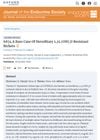
research A Rare Case of Hereditary 1,25-Dihydroxyvitamin D Resistant Rickets
A rare genetic mutation causes resistance to vitamin D, leading to severe rickets and requiring high doses of calcium and vitamin D for treatment.
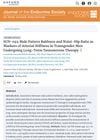
research Male Pattern Baldness and Waist-Hip Ratio as Markers of Arterial Stiffness in Transgender Men Undergoing Long-Term Testosterone Therapy
Male pattern baldness may indicate arterial stiffness in transgender men on long-term testosterone therapy.

research Polycystic Ovary Syndrome and Fertility
PCOS affects fertility and is linked to obesity and menstrual irregularities; lifestyle changes are recommended for treatment.
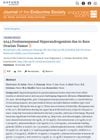
research Postmenopausal Hyperandrogenism Due to Rare Ovarian Tumor
A rare ovarian tumor caused high testosterone in a postmenopausal woman, resolved by surgery.
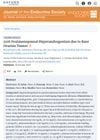
research Postmenopausal Hyperandrogenism Due to Rare Ovarian Tumor
Rare ovarian tumors can cause hyperandrogenism, even if imaging appears normal.
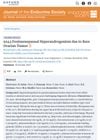
research Postmenopausal Hyperandrogenism Due to Rare Ovarian Tumor
Bilateral salpingo-oophorectomy resolved hyperandrogenism in a postmenopausal woman with rare ovarian tumors.
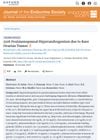
research Postmenopausal Hyperandrogenism Due to Rare Ovarian Tumor
Rare ovarian tumors can cause hyperandrogenism, even if imaging appears normal.

research Voice Changes in Reproductive Disorders, Thyroid Disorders, and Diabetes: A Review
People with reproductive, thyroid disorders, and type 2 diabetes can experience voice changes, but more research is needed to understand this better.

research Synchronous Profiling and Analysis of mRNAs and ncRNAs in the Dermal Papilla Cells from Cashmere Goats
Non-coding RNAs help control hair growth in cashmere goats.

research Hair Loss in Hospital Medicine: A Practical Guide
The guide helps clinicians diagnose and manage hair loss, detailing examination techniques and treatments for different types of alopecia.

research A Population-Based Study on the Common Androgenic Symptoms in PCOS and Its Management
Recognizing and managing hirsutism, alopecia, and acne is crucial for improving wellbeing in women with PCOS.

research Hair Regrowth
Finasteride and minoxidil are effective for hair regrowth, while treatments for alopecia areata have varying success and continuous treatment is necessary.

research A Primer for Studying Cell Cycle Dynamics of the Human Hair Follicle
The document concludes that understanding hair follicle cell cycles is crucial for hair growth and alopecia research, and recommends specific techniques and future research directions.

research The Basic Science of Hair Biology
Hair disorders are caused by a complex mix of biology, genetics, hormones, and environmental factors, affecting hair growth and leading to conditions like alopecia.

research Melatonin in the Topical Treatment of Androgenetic Alopecia
Topical melatonin is a safe treatment that may reduce hair loss in people with androgenetic alopecia.

research The Use of Stem Cell Differentiation Stage Factors Taken from Zebrafish Embryos During Organogenesis and Their Role in Regulating Gene Expression of Normal and Pathological Cells
SCDSFs from zebrafish embryos are beneficial for treating cancer, regenerating tissues, and improving conditions like psoriasis and alopecia.

research Use of Cyproterone Acetate in the Treatment of Acne, Hirsutism, and Virilism
Cyproterone acetate is effective for acne but less so for hirsutism and alopecia, with some side effects and quick menstrual cycle recovery after treatment.